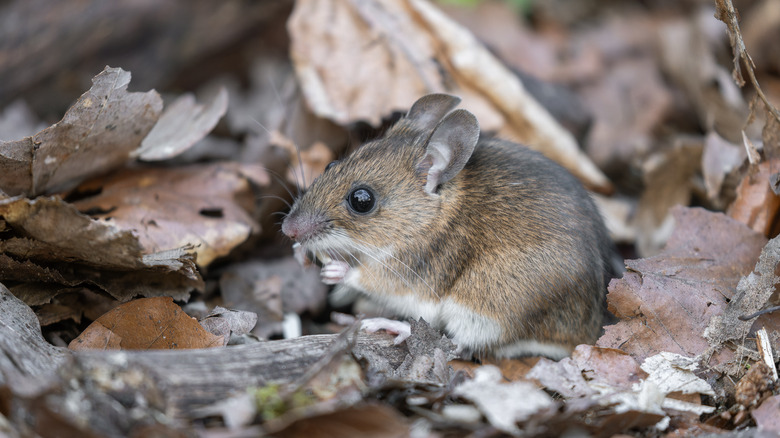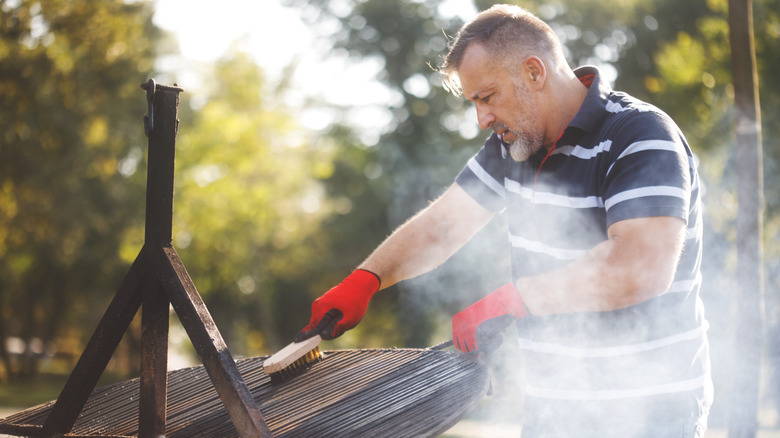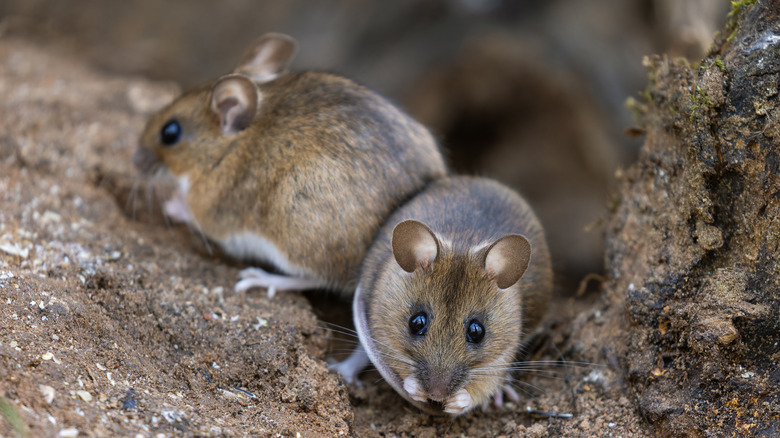Prevent Mice From Living In Your Grill With These Simple Steps
Early on a hazy Sunday morning, you're watering your garden. Suddenly, you hear a squeak. You check the hose connection and — nothing. So, you go about your day. Later, you're putting out the patio chair cushions for your family barbecue, only to hear the squeaking again. You check around the table and see nothing, so you keep getting ready. In the evening, you bring the hot dog platter out, lift the grill hood, and several pairs of blinky eyes look back at you. A family of squeaky mice has moved into your patio grill.
Without thorough preventative measures, having a mouse nest in your grill is almost inevitable. These little squeakers, seeking adequate shelter, have learned to find homes among human residences inside and out. "The longer the mice lived with humans, the better they are at problem-solving," Anja Guenther of the Max Planck Institute in Munich told Christopher Intagliata on his podcast "Science, Quicky" for Scientific American. "... Mice really developed higher enhanced cognitive abilities while living with humans."
What could be cozier for a little mouse family than a grill? It smells like food, keeps them out of the rain or bad weather, and is a fortress against predators like hawks. The problem is that they can also make the grill gross. Although mice are master adaptors, there are a handful of ways to keep them from moving into your barbecue. Don't let Stuart Little's mouse parents derail your family dinner.
Keeping mice out means keeping clean
As we're shifting into sweater weather, mice often look for places to hold out for the colder months. Even though your mouse inhabitation problems are more likely in the autumn, you may want to keep these preventative tips in mind all year. After all, the tantalizing aroma is bound to attract fans if you're cooking on your grill. That's why the best thing you can do to keep mice from moving in is thoroughly cleaning your grill. Crumbs and other leftover goodies are calling cards for a mousey meal. So it's important to remove any residue anytime you cook, regardless of where they may be on your grill.
When grilling season is over, be sure to store your grill (preferably with a cover) in a dry area. A cover will create another barrier for entry for the mice while protecting your grill from debris or dirt. It's also advised to close vents when the grill is out of seasonal use, giving the mice fewer places to scamper.
You can also take a few easy steps to keep mice away without relying on chemicals. For instance, they despise the smell of peppermint oil. Peppermint is the essential oil that'll keep your home free of mice, too! Spraying peppermint around your grill can help deter mice, no matter how tasty the food you're cooking smells to them.
How to clean a grill after mice
Should you discover that some mice were living rent-free in your outdoor grill, don't panic. Yes, their droppings make the area unsanitary, but with some elbow grease, you'll be grilling up a storm again in no time. With gloved hands, a face mask, and a scraping tool, get all of the feces, leftover food, and anything else off of the inside of the grill. Follow up with a degreaser to get the remaining debris out of the grill and rinse any remaining residue. Then, give the grill a once over with hot water and soap to disinfect the grill.
Grill company Weber recommends towel drying the grill rather than air drying since air drying can lead to corrosion — should that happen, you can utilize the best method for cleaning your rusty grill. The company also recommends, after scraping the debris but before cleaning, close the grill and let it run on high for half an hour to sterilize. From there, they say you can follow up with cleaning.
Preventing mice from moving into your grill is much easier than cleaning up after them. So, before you become a barbecue boarding house, remember to set aside a little time after grilling to keep everything clean.


